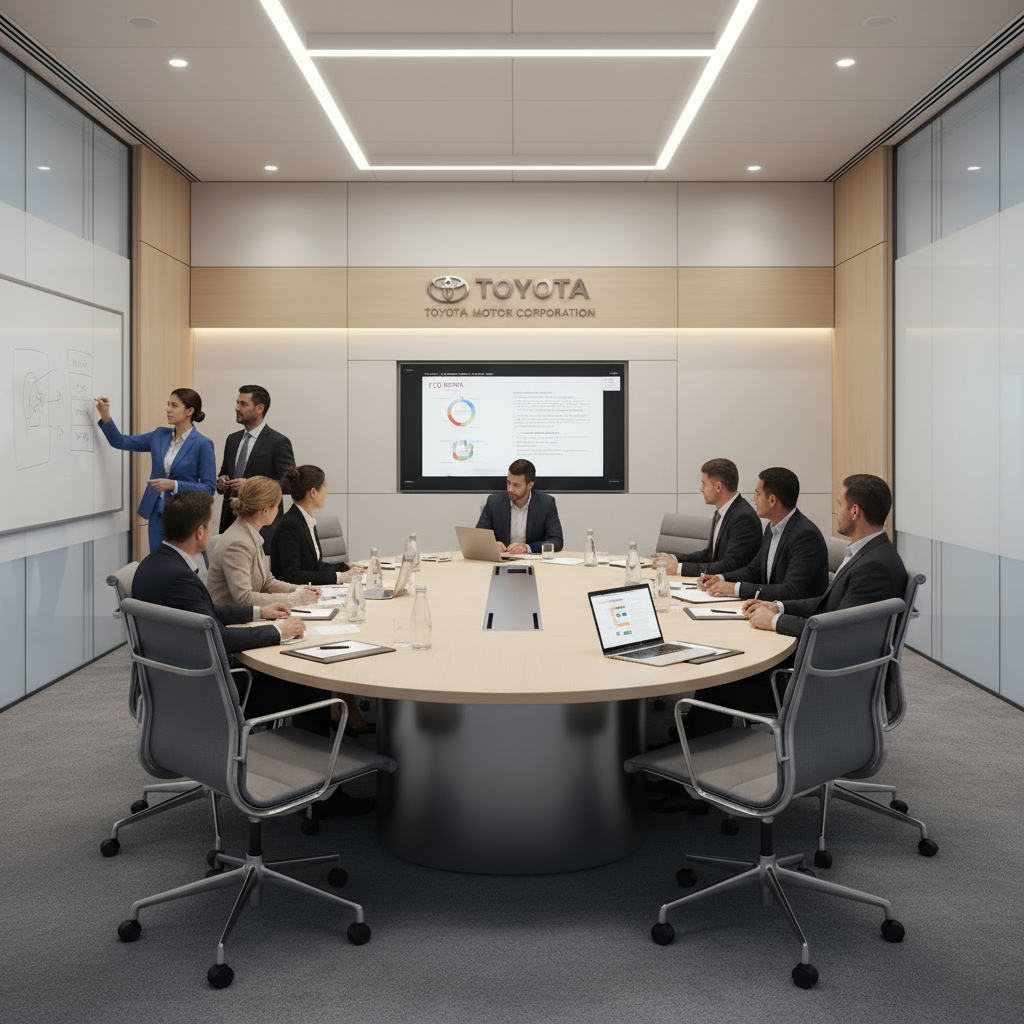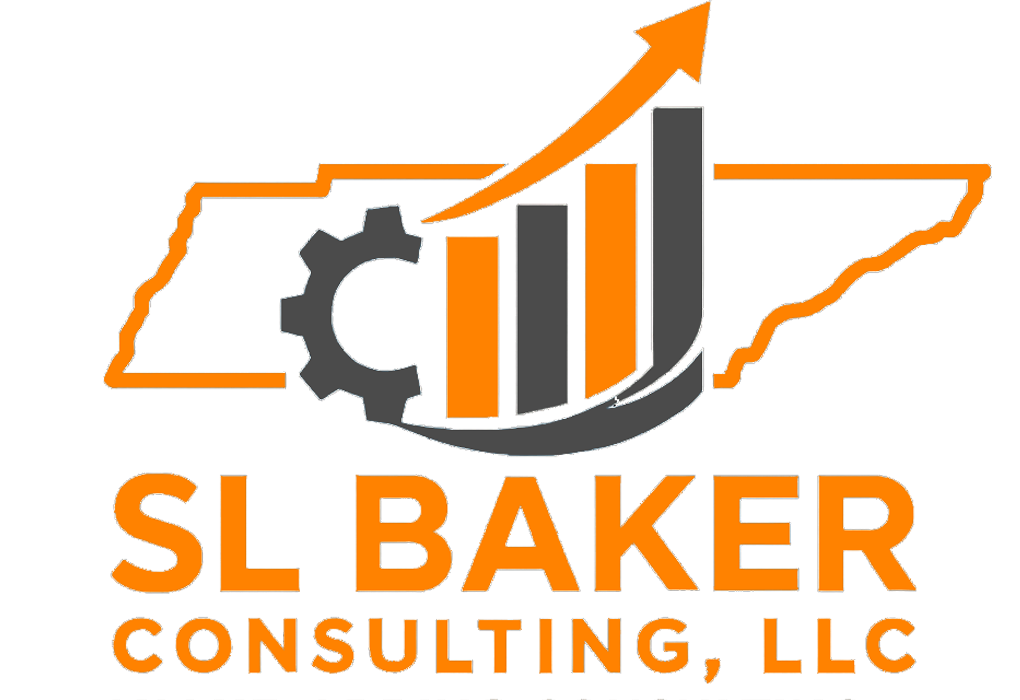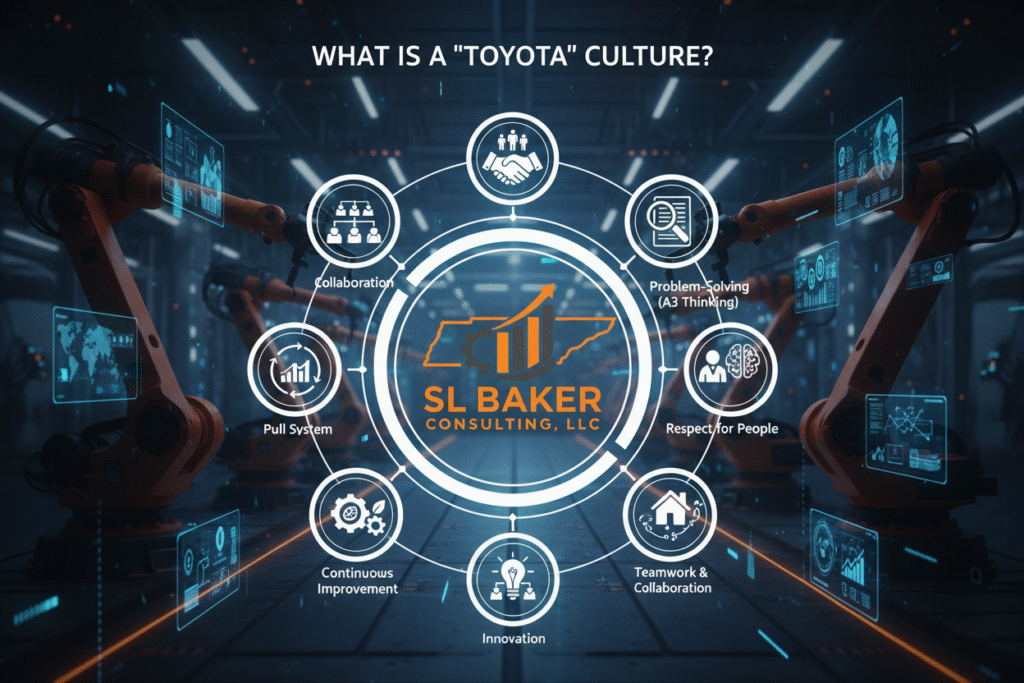The success of Lean practices in manufacturing is often attributed to the underlying cultural framework that supports them which I call the “Toyota Culture.” This culture, which emphasizes collaboration, respect for individuals, and continuous improvement, serves as the foundation upon which effective Lean implementation is built. Understanding the essence of the Toyota Culture and its critical role in Lean initiatives is vital for organizations aiming to enhance their operational effectiveness.

Defining the Toyota Culture
The Toyota Culture is not merely a collection of processes or tools; it embodies a holistic approach to management and employee engagement. At its core, the Toyota Culture is characterized by principles that prioritize respect for people, continuous improvement (Kaizen), Gemba walks, servant leadership, and employee empowerment.
Respect for people fosters an environment where every employee is valued for their contributions, encouraging mutual respect between management and workers. Continuous improvement is a fundamental aspect of this culture, instilling a mindset in employees at all levels to seek opportunities for enhancement, regardless of how small. Gemba, meaning “the real place” in Japanese, emphasizes the importance of leaders visiting the shop floor to observe processes and engage with employees, thereby building relationships and deepening understanding.
Servant leadership is another critical element, wherein leaders prioritize the needs of their teams over their own, often asking questions such as “How can I help?” and “What do you need?” This approach empowers employees and fosters a sense of ownership and accountability. Finally, employee empowerment allows individuals to make decisions regarding their work, which is essential for sustaining Lean practices.

The Importance of Cultural Buy-In
Before embarking on a Lean journey, it is crucial to establish a solid cultural foundation. A strong organizational culture aligns the goals of management and employees, creating a unified direction essential for driving collective efforts necessary for Lean practices to take root. When every employee understands that their primary responsibility is to support hourly operators and facilitate their success, a cohesive environment is fostered.
Additionally, a Toyota Culture enhances employee engagement by ensuring that individuals feel valued and respected. Employees who perceive their contributions as significant are more likely to participate actively in Lean initiatives, leading to increased identification of improvement opportunities and effective solutions. Open communication, a hallmark of the Toyota Culture, enables leaders to engage with employees, breaking down silos and fostering collaboration. This improved communication is vital for understanding challenges on the shop floor and addressing them effectively.
Furthermore, the empowerment and ownership of employees play a pivotal role in Lean success. A culture that emphasizes servant leadership and employee empowerment encourages individuals to take ownership of their work. When operators feel they have the authority to make decisions and contribute to problem-solving, they are more inclined to invest time and effort in improving processes, which is essential for the sustainability of Lean practices. Finally, the commitment to continuous improvement instilled by the Toyota Culture encourages employees to identify inefficiencies and propose solutions leading to a cycle of ongoing enhancement.
Building Relationships Through Gemba Walks
Gemba walks are a cornerstone of the Toyota Culture, serving as a powerful mechanism for leaders to connect with employees and gain insights into operations. These walks provide leaders with opportunities to observe processes in real time, allowing them to identify inefficiencies, understand workflow challenges, and gather valuable feedback from operators.

During Gemba walks, leaders demonstrate their commitment to understanding the work being done, which signals to employees that their contributions are valued. This visibility fosters trust and strengthens relationships, creating a culture in which employees feel comfortable voicing their opinions and concerns. Moreover, Gemba walks promote a culture of learning and curiosity. Leaders who actively seek to comprehend processes and challenges encourage employees to adopt a similar mindset, ultimately fostering a culture of continuous improvement throughout the organization.
The Role of Servant Leadership
Servant leadership is critical to the Toyota Culture, highlighting the importance of leaders who prioritize the needs of their teams. This leadership approach supports employee success by focusing on helping individuals excel in their roles. By asking questions such as “How can I help?” and “What do you need?” leaders demonstrate a commitment to removing obstacles and providing the necessary resources for success.
Additionally, servant leadership builds trust and respect among teams. Employees are more likely to engage in Lean initiatives when they feel supported and valued by their leaders. This approach also encourages empowerment, allowing employees to take ownership of their work and contribute meaningfully to problem-solving efforts. Furthermore, servant leadership fosters collaboration across departments and functions, facilitating open communication and teamwork essential for successful Lean initiatives.

The Risks of Skipping the Cultural Foundation
Attempting to implement Lean practices without establishing a Toyota Culture can lead to several detrimental outcomes. Without a supportive culture, employees may resist Lean initiatives, perceiving them as top-down mandates rather than collaborative efforts. This resistance can undermine the effectiveness of Lean practices and lead to frustration among both leaders and employees.
Moreover, when employees do not feel valued or empowered, their engagement levels decline. This disengagement can result in lower productivity, increased turnover, and missed opportunities for improvement. A lack of open communication may lead to misunderstandings and misalignment of goals, hindering the success of Lean initiatives. Additionally, without a culture of continuous improvement, organizations may prioritize short-term gains over long-term sustainability, resulting in superficial changes that fail to address root causes.

Steps to Establishing a Toyota Culture
For organizations aiming to implement Lean successfully, establishing a Toyota Culture is a critical first step. Leadership must demonstrate a strong commitment to this culture, modeling behaviors and values that promote respect, empowerment, and continuous improvement. Investing in training programs that emphasize the principles of the Toyota Culture, including servant leadership, effective communication, and problem-solving techniques, is essential.
Leaders should prioritize regular Gemba walks as a means of connecting with employees and gaining insights into operations. Creating channels for open communication, where employees feel comfortable sharing ideas, concerns, and suggestions, further solidifies this culture. Celebrating and recognizing the contributions of employees who embody the principles of the Toyota Culture reinforces the importance of collaboration and continuous improvement.

Conclusion
The Toyota Culture is the bedrock of successful Lean implementation. By fostering a culture that values respect for individuals, continuous improvement, and servant leadership, organizations can create an environment conducive to Lean practices. Establishing this culture requires a top-down commitment, engaging employees at all levels, and prioritizing their success.
When organizations invest in building relationships and empowering their workforce through practices like Gemba walks and open communication, they lay the foundation for sustainable Lean success. Ultimately, the key to effective Lean implementation lies not in the tools or techniques, but in the cultural foundation that supports them. Embracing the Toyota Culture is essential for any organization seeking to thrive in today’s competitive landscape.
Get in touch
Have questions or ready to take the next step? Reach out to us—we're here to help with your fitness journey. Whether you're looking for guidance, scheduling a session, or just want more information, we've got you covered.




